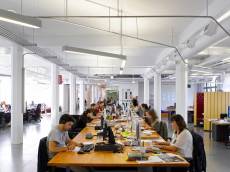May 14, 2013
How ingrained assumptions about the workplace are eroding
The first day at a new job used to mean getting the answer to that all important question: “so which is my office?” In today’s mostly open plan environments, the same psychological attachment has been transferred to the desk – ‘my’ desk. However the current trend for flexible approaches to where people work means that even the concept of having one’s own desk is now under attack. So how much does having your own desk matter to the UK office workforce these days? We have been asking employees how they feel about having their own desk. The results seem to be that more than half, on average 56% (of a total of 2,653 employees surveyed at 5 recent client projects), think that it is ‘very important’ and a further 25% think it is ‘quite important’.






















May 21, 2013
Office hierarchy determines ergonomic quality of workplace
by Sara Bean • Comment, Facilities management, Furniture, Knowledge, News, Technology
When you consider health and safety dangers at work, there is really no contest between the risks blue collar workers face – falls from height, heavy lifting and breathing in asbestos dust – compared to the relatively minor mishaps of the average office worker. But it seems there is no such thing as an ‘average’ office worker either and where you fit in the pecking order could have a direct impact on the level and quality of the ergonomic tools you’re offered. According to a worldwide survey published by Jabra and YouGov there is a great demographic divide when it comes to the ergonomic equipment provided within the office – and your level of education and department play a significant role in how well you are seated and whether you are offered a headset or handset. (more…)